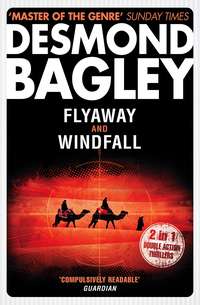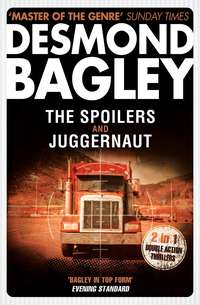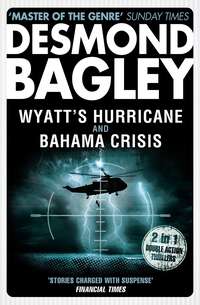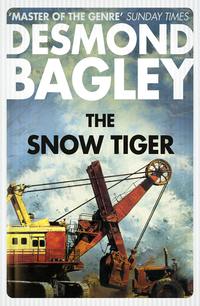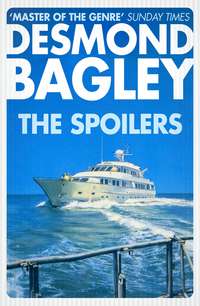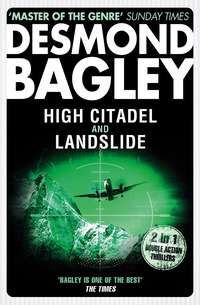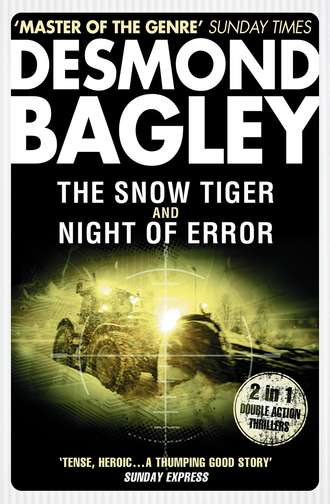
Полная версия
The Snow Tiger / Night of Error
McGill said, ‘As for your Latin tag, Mr Gunn, I have never believed that latinity confers virtue on stupidity, and therefore I do not believe that one should never speak ill of the dead. I believe in the truth, and the truth is that the death toll in the Hukahoronui disaster was much higher than need be. The reason lies in the actions, reactions and inactions of many men who were confronted with an unprecedented situation beyond their understanding. Mr Quentin was one such man. I know that he died in the disaster, and I know that he died heroically. Nevertheless, the truth must be told so that other men, in the future, when faced with a similar situation will know the right things to do.’
‘Mr Chairman!’ Gunn was waving his arm, but Rickman had beaten him to it. He was on his feet, finger upraised. ‘This is monstrous! Must a witness make speeches and lecture us to tell us our duty? Must …’
Harrison’s gavel cracked down sharply, cutting off Rickman in mid-spate. ‘Mr Rickman, may I again remind you that this is not a court of law and that procedure is at my sole discretion. Dr McGill has just restated the nature and intention of this Commission of Inquiry in words more well chosen and acute than I myself used yesterday during the opening proceedings. I have noted in counsel a regrettable tendency to adversary tactics, a practice against which I warned you. I will have no more of it.’
There was a dead silence.
Dan Edwards was busily scribbling. ‘Boy, oh boy, oh boy! Good copy at last.’ He tore off a sheet and handed it to a youth behind him. ‘Get that back to the office as fast as you can.’
Harrison laid down his gavel. ‘Dr McGill: you say that the mine management had a meeting with the Hukahoronui Town Council on the afternoon of Friday, the fifth of July.’
‘No, sir. I said that was the arrangement at the meeting in the morning. In the event it proved to be impossible.’
‘Why?’
‘Three of the councillors were absent from town that day and it was impossible to find a quorum. The meeting was held next morning – the Saturday morning.’
‘A delay of half a day.’
‘Yes, sir.’ McGill hesitated. ‘Mr Ballard and I debated whether or not to approach the two councillors who remained in town and we decided against it. Our view was that such an important matter should be communicated to the council as a whole; we did not want to tell a complicated story twice.’
‘So you met on the Saturday?’
‘Yes, sir. There was one other person present at my request.’
‘Oh, who was that?’
‘Mr Turi Buck. I have to tell you that I was not present during the entire meeting. I left half way through.’
Harrison bent forward and said to Reed, ‘Is Mr Buck present?’
‘Yes, Mr Chairman.’ Reed turned in his seat. ‘Will you step forward, Mr Buck?’
Turi Buck came forward and stood before the rostrum. ‘Were you present during the entire meeting under discussion, Mr Buck?’ Harrison asked.
‘Yes, sir; I was.’ Turi’s voice was strong.
‘Then you will replace Dr McGill in the witness chair.’
McGill stepped down and went back to his place, winking at Ballard as he passed.
EIGHT
Harrison said, ‘Mr Buck, would you be related to that illustrious member of your race, Sir Peter Buck?’
A ghost of a smile hovered on Turi’s seamed face. ‘No, sir.’
‘I see.’ Harrison drew his note-pad towards him. ‘Can you tell us who was present at this meeting?’
‘There was Ia … Mr Ballard and Mr Cameron from the mine. Dr McGill was there. And there was Mr Houghton, the mayor, and Mr Peterson – that’s to say John Peterson – and Eric Peterson, Mr Warrick and Mrs Samson.’
‘The last five were members of the council?’
‘Yes, sir.’
Harrison consulted a list. ‘Wasn’t Mr Quentin present?’
‘Oh yes; he was there. I forgot about him.’
‘Well, Mr Buck, perhaps you can tell us what went on at the meeting.’
Turi frowned. ‘It started off by Dr McGill telling of what he’d found. From what I’ve been hearing while I’ve been here I’d say it was just what he’d said at the meeting at the mine on the Friday. He told them there was a danger of avalanche and he told them why.’
‘What was the general reaction?’
‘They didn’t believe him.’
Lyall put up his hand. ‘Mr Chairman.’
‘Yes, Mr Lyall?’
‘It is incumbent on me to point out that of the ten people present at that meeting only four are able to be here at this inquiry. I ought to add that of the five council members only Mr Eric Peterson is able to be here.’
Harrison stared at him. ‘Now that you have given me that information – of which, I might add, I was well aware – what am I supposed to do with it?’
‘With respect, sir, one might think that Mr Eric Peterson is best qualified to give the reaction of the council.’
‘Does Mr Peterson wish to be a witness?’
‘He does.’
‘Then he will have his chance later. At present we are hearing the evidence of Mr Buck.’
‘Again with respect, Mr Chairman; may I point out that of the original mine management only Mr Ballard is here. Mr Dobbs and Mr Quentin are dead, and Mr Cameron is in hospital. It is well known in Hukahoronui that Mr Ballard and Mr Buck are friends of many years standing, and there has been evidence given here of the friendship between Mr Ballard and Dr McGill. It may be thought that the evidence given here is, shall we say, too one-sided.’
Harrison leaned back in his chair. ‘It is evident, Mr Lyall, that you are doing at least one of two things. You are impugning the integrity of this Commission, or you are questioning the honesty of Mr Buck. Possibly you are doing both. Do I understand you correctly?’
‘I do not question the integrity of the Commission, sir.’
Turi’s face was stricken as he half rose from his chair. Ian Ballard wriggled in his seat. He dug his elbow into Rickman’s ribs, and said, ‘The bastard! the utter bastard! Intervene and get on with that line of questioning I gave you.’
Rickman shook his head. ‘It would be most unwise. It wouldn’t be in the interests of the company.’ He twisted his head and looked at Lyall. ‘See how he’s stirring things up.’
‘But, God damn it, he’s making us into some sort of conspiracy.’
Rickman stared at him unwinkingly. ‘But not involving the company,’ he snapped.
Turi Buck lifted his hands helplessly. They were trembling as he said to Harrison, ‘May I be excused from the witness chair, sir?’
‘No, you may not, Mr Buck.’ Harrison turned his head. ‘Yes, Mr Ballard?’
Ballard lowered his hand. ‘I would like to question Mr Buck.’
Harrison frowned. ‘I thought you had representation, Mr Ballard. I gave warning at the beginning of this hearing that I would not allow it to be turned into a free-for-all.’
Ballard said, ‘As of thirty seconds ago Mr Rickman ceased to represent me personally. He will, of course, continue to represent the company.’
A wave of noise washed across the hall. Amid the uproar Rickman said, ‘You bloody young fool! What the devil do you think you’re doing?’
‘You’re fired,’ said Ballard briefly.
Harrison wielded his gavel lustily and at last achieved relative quietness. ‘If there is any more uproar I will have the public gallery cleared,’ he announced. ‘These proceedings will be conducted in an orderly manner.’ He waited until there was utter silence, broken only by the creaking of the old wooden floor, before he addressed Ballard. ‘Are you asking for an adjournment so that you may obtain a new legal adviser?’
‘No, sir. For today, at least, I am content to represent myself. I do not wish to waste the time of the Commission.’
Harrison allowed himself a wintry smile. ‘Very laudable. I wish the legal fraternity would follow your example. And you wish to interrogate Mr Buck?’
‘Yes, sir.’
‘I object,’ said Rickman. ‘Apart from the personal insult to me in being dismissed so cavalierly and in public, I consider this to be most irregular.’
Harrison sighed. ‘Mr Rickman, you have been told many times that the procedure of this Commission is a matter for my discretion. Even in a law court it has not been unknown for a person to represent himself, choosing not to enlist the aid – or otherwise – of a lawyer. Therefore I will allow it.’ He held up his hand. ‘And I will entertain no argument about it. Proceed, Mr Ballard.’
Ballard smiled at Turi. ‘I will not comment on any remarks that have been made here, but will go on from your last relevant statement. Mr Buck, you said that the councillors did not believe Dr McGill when he informed them of avalanche hazard. What were their reasons for disbelief?’
‘They said there had never been avalanches in the valley.’
‘Did they? Mr Chairman, is it possible to have a map of the valley on view?’
‘Provision has been made. Mr Reed, will you see to it.’
Presently a large-scale map was set up on an easel behind the witness chair. Harrison said, ‘Since this map is evidence of a sort we must be sure that it is the best evidence. Mr Reed, call your technical witness, please.’
‘Call Mr Wheeler.’
Wheeler was new to Ballard, who regarded him with interest. He returned his gaze to the map, and his eyes narrowed suddenly. Reed said, ‘What is your full name?’
‘Harold Herbert Wheeler.’
Harrison said, ‘There is no need for you to take the witness chair, Mr Wheeler. Your evidence is technical and will not take long. What is your occupation?’
‘I am a cartographer employed by the Lands and Survey Department of the New Zealand Government.’
‘And you have prepared this map especially for this Inquiry?’
‘That is correct, sir.’
‘What does the map represent?’
‘It depicts the Hukahoronui Valley, including the township of Hukahoronui. The scale is one in two thousand, five hundred; that is twenty-five inches to the mile approximately.’
‘Does it represent the valley before or after the disaster?’
‘Before, sir. It is drawn according to the latest information available to the Topographical Office.’
‘Thank you, Mr Wheeler. That will be all.’
Ballard said, ‘Could Mr Wheeler hold himself available for possible further questions?’
Harrison wrinkled his brow. ‘I suppose so, Mr Ballard. You will stay available, Mr Wheeler.’
Ballard studied the map. ‘Mr Buck, I would like you, if you will, to point out on this map your own house.’ Turi stood up and indicated a point on the map with his finger. ‘And the Peterson store.’ Turi’s hand came up around in an arc and stopped. ‘Now my house.’ Again Turi pointed. ‘And the mine portal.’
‘I fail to see the point of this,’ said Rickman.
‘The point is to prove that Mr Buck can read a map as well as the next man,’ said Ballard pleasantly. ‘Mr Buck, at the meeting with the council was a map produced?’
‘Yes, but not as big as this one.’
‘And were you asked to point out various places on that map?’
‘Yes, sir.’
‘Now I want you to think very carefully. I don’t want you to say anything here, because of my questioning, that was not said at the meeting with the council. Do you understand?’
‘Yes.’
‘Why did you attend the meeting?’
‘Because Dr McGill asked me to go.’
‘Do you know why he asked you to go?’
‘He said I knew more about the history of Hukahoronui than anyone else he’d met.’
‘You say the reaction of the council was that there had, hitherto, never been avalanches in the valley. Was that the reaction of all the councillors?’
‘It was – at first.’
‘So their views changed, then. Let us find out why. Mr Buck, you are of the Maori race. Do you understand the language?’
‘Yes, sir.’
‘Can you give us a translation – a free translation, if you like – of the name, Hukahoronui?’
‘Yes, sir; it means “The Great Snow Slide”.’
There was a subdued murmur from behind Ballard. ‘Would you point out your own house again, Mr Buck. There is a great rock between your house and the mountainside, is there not? What is the name of that rock?’
‘Kamakamaru.’
‘Kamakamaru,’ repeated Ballard. ‘Can you translate that into English?’
‘It means “The Rock of Shelter”.’
Again came that quickly suppressed sound in the hall. ‘When was your house built, Mr Buck?’
‘It was built by my father about 1880, but there was a house there before built by my grandfather.’
‘Let us get one thing straight. Your family did not live in Hukahoronui before the incursion of the white settlers into New Zealand?’
‘Before the Pakeha! No, sir, my family came from North Island.’ Turi smiled. ‘It was said that we came to South Island to escape the Pakeha.’
‘Did your family name the valley and the rock?’
‘No, they were already named. There were some of my people living close by. Not in the valley, but close by.’
‘Did your father replace your grandfather’s house because, let us say, it had been damaged by an avalanche?’
‘No, sir. He replaced it because the house was in bad condition and because the family was growing larger.’
Ballard was silent for a moment as he consulted a paper. At last he raised his head and asked quietly, ‘Mr Buck, do you, of your own knowledge, know of any avalanches in the valley of Hukahoronui?’
‘Yes, there was an avalanche in 1912 when I was a boy. A family called Bailey had built a house quite close to ours but not protected by Kamakamaru. My father warned the Baileys but they took no notice of him. There was an avalanche in the winter of 1912 and the Bailey house was swept away. The whole family died – all seven of them.’ He looked at Ballard and said definitely, ‘I was there – I helped dig out the bodies.’
‘So the rock – Kamakamaru – acted as a splitting wedge. Is that it?’
‘The snow flowed around Kamakamaru, and our house was safe.’
‘But the Bailey house was destroyed. Any more avalanches?’
‘There was one in 1918.’ Turi hesitated. ‘I was not there; I had joined the army. I had a letter from my father saying there had been an avalanche.’
‘Again on the western slope?’
‘Yes. There were no lives lost nor damage to property, but the snow blocked the flow of the river and there was flooding. The farmers lost a lot of stock by drowning.’
‘A six-year gap. Any more?’
‘There was the avalanche of 1943.’
‘Did you see that avalanche actually fall?’
‘No – but I remember it broke a lot of trees on the west slope. I used to collect firewood there afterwards.’
‘Yes,’ said Ballard. ‘There was a lot of good firewood around there for two or three years. Were there any fatalities in the avalanche of 1943?’
Turi’s eyes opened wide. ‘Why, yes, Ian. Your father was killed.’
The hall had been quiet as Ballard led Turi through his evidence but now there was a gust of pent-up emotion let loose in a wave of sound. Harrison let it die away before he rapped gently with his gavel.
Ballard said, ‘Could you point out on the map the place where my father was killed?’
Turi stretched out his hand. ‘There,’ he said. ‘Just where the mine office is now.’
‘How do you know it was there?’
‘Because you showed me three days after it happened. You had seen it happen.’
‘And how old was I then, Mr Buck?’
Turi considered. ‘Maybe four years.’
‘Mr Buck, you have given us a lot of information. Was the same information given to the councillors at the meeting?’
‘Yes, it was.’
‘Thank you, Mr Buck.’
Ballard leaned back and glanced sideways at Lyall who already had his hand up. ‘I would like to ask Mr Buck one or two questions.’
Harrison nodded. ‘Very well.’
‘Was the avalanche of 1943 a very large one?’
Turi thought about it, then nodded his head vigorously. “Very large – bigger than the one in 1912.’
Lyall looked pleased. ‘I see. Could you say, perhaps by indicating on the map, just how far down the slope it came?’
‘Just to the bottom. Mr Ballard’s father was killed here. It didn’t go much farther than that’
‘It didn’t go as far as the Peterson Supermarket?’
‘It didn’t go anywhere near the Peterson store.’
‘Remarkable. Now tell me, Mr Buck: if the Peterson Supermarket was not destroyed by a very big avalanche in 1943, why then was it destroyed this year?’
Turi looked blank, then said, ‘The trees, of course.’
Ballard let out a long sigh and let Lyall dig his own pit. Lyall said, ‘The trees! Oh, you mean that timbered area marked on the west slope?’
Turi turned to look at the map. He examined it for a moment, then said, ‘But this is all wrong.’
Ballard put up his hand. ‘Mr Chairman – on a point of evidence. I would like to have Mr Wheeler recalled briefly. It would seem that his map is not the best evidence.’
Harrison looked startled, then raised his eyebrows. ‘Mr Lyall?’
Lyall frowned, but said, ‘No objection.’
Wheeler was brought back and Ballard said, ‘Look at the map, Mr Wheeler. Do you see that forested area on the western slope of the valley?’
‘Yes, sir.’
‘I can bring five hundred witnesses to swear that that area was not forested before the avalanche struck. What do you say to that?’
Wheeler did not know what to say to it. He twitched nervously for a while, then said, ‘The information I put into that map comes from the latest sources available.’
‘But not late enough, it would seem. In respect of a vital piece of evidence – the lack of timber on the western slope – this map is untrue. Is that correct?’
Wheeler shrugged. ‘If you say so. I have never been to Hukahoronui myself.’
‘It is not for me to say,’ said Ballard. ‘But let us ask Mr Buck. When were the trees cut?’
‘They started cutting when the mine opened. The timber went into the mine and for building houses.’
‘That was four years ago?’
‘Yes. The cutting went on for two years. By that time the slope was just about stripped.’
Rolandson stirred, and said, ‘Mr Ballard, are we to understand that you regard the cutting of that timber as a contributory factor which led to the avalanche?’
Ballard hesitated. ‘I am not an expert on avalanches, sir. I would prefer you to direct that question to Dr McGill.’
‘I will,’ growled Rolandson, and conferred for a few moments with Harrison. They both looked at Wheeler who shuffled his feet nervously. ‘You have not been to Hukahoronui and yet you present this map as evidence,’ said Harrison unbelievingly. ‘That is what you said, isn’t it?’
‘Yes,’ said Wheeler unhappily.
He was even more unhappy when Harrison had finished with him and sent him off. When Lyall was asked if he had further questions he warily said that he had none. Ballard raised his hand. ‘I would like to ask Mr Buck one more question.’
‘Very well.’
‘Mr Buck, what was the immediate reaction of the councillors towards your revelations about the incidence of avalanches in Hukahoronui?’
Turi Buck froze. In a low voice he said, ‘I would rather not say.’
‘Mr Buck – I must ask you the question.’
Turi shook his head. ‘I will not say.’
‘You must answer the question, Mr Buck,’ said Harrison, but Turi shook his head dumbly.
Harrison looked at Ballard blankly for a moment and Ballard shrugged. The hall was very quiet when someone said, ‘I can answer that question.’
Harrison’s head jerked. ‘Dr McGill, this is most unseemly.’
McGill stepped forward. ‘Mr Chairman, there are only four people who can answer the question. Mr Buck refuses for reasons I can understand. Mr Eric Peterson will not answer, again for reasons I can understand. In all propriety Mr Ballard cannot, because he is interrogating Mr Buck – he cannot be questioner and witness simultaneously. I am the only one left who was present at the meeting.’
Harrison sighed. ‘Very well, you will answer the question. What was it, Mr Ballard?’
‘What was the immediate reaction of the councillors to Mr Buck’s evidence?’
McGill unzipped his satchel and drew forth a flat notebook. ‘As is my habit, I took notes immediately after the meeting. I can read here exactly what was said.’ He selected a page and stared at Eric Peterson where he sat next to Lyall. ‘Mr Eric Peterson’s exact words were, “Turi Buck is an ignorant old black man. He knows nothing – he never has and he never will”.’
There was pandemonium in the Press gallery.
The hall errupted in a babble of noise and Harrison hammered in vain on the rostrum but the crash of his gavel was lost in the uproar. When, at last, he could make himself heard, he said in anger, ‘This hearing is adjourned until further notice and until those present can control themselves.’
NINE
‘Turi Buck is an ignorant old black man. He knows nothing – he never has and he never will.’
The words hung heavily in an embarrassed silence in the residents’ lounge of the Hotel D’Archiac which did duty as a council chamber. At last Matthew Houghton coughed nervously, and said, ‘There’s no call for that sort of talk, Eric’
Ballard was angry. ‘I should bloody well think not.’
John Peterson, who was standing, put his hand on his brother’s shoulder. ‘Eric, if you can’t talk sense you’d better keep your big mouth shut. You’re starting to behave like Charlie.’ He looked at Turi. ‘My apologies.’
‘Maybe you’d better let Eric make his own apologies,’ said Ballard tightly.
Eric went red in the face but said nothing. John Peterson ignored Ballard and addressed himself to McGill. ‘So you’ve come up with past avalanches, and now you say there’s going to be another.’
‘I have not said that.’
‘Then what are you saying?’ demanded Houghton.
McGill spread his hands. ‘Who cares if a few thousand tons of snow falls off a mountain? It’s happening all the time in the Southern Alps. But if someone is standing underneath at the time then it’s downright dangerous.
That’s the position you’re in. You have a potential hazard here.’
‘Not an actual hazard?’ queried John Peterson.
‘I can tell you more after another series of tests. But I’ll tell you this – the hazard isn’t getting any less.’
Peterson said, ‘It seems pretty flimsy to me. From the line you’re shooting it seems to me that you want us to spend a lot of money because of something that may never happen.’
‘There’s something I don’t understand,’ said Houghton. ‘If there have been avalanches in the past, why weren’t the houses knocked down? My house was the second one built in the valley; my grandfather built it in 1850, two years after the Otago Settlement.’
Ballard said, ‘Let’s have a look at the map.’ He pushed the map across the table to Houghton. ‘Matt, I want you to cast your mind back, say, twenty years – before all the houses were built when the mine started. I want you to mark all the houses you can remember.’ He handed Houghton a pen.
‘Well, there’s my house there, and Turi Buck’s house – but we know why that’s still there. And there’s the Cunningham house, and the Pearman house …’
‘… and the Jackson place and the old Fisher house,’ said Mrs Samson.
Slowly Houghton marked them all and then leaned back. Ballard said, ‘Don’t forget the church and the school – and Peterson’s store.’
Houghton scratched more crosses on the map, and Ballard said, ‘Just look at it. All those buildings are well scattered and if you look at the terrain you’ll see that every one of them is protected against falls from the western slope to a greater or lesser degree.’ He picked up the pen. ‘But we do know there was another building – the Bailey house.’ He marked its position on the map. ‘That’s gone now.’
Mrs Samson said, ‘What are you getting at?’
‘When the settlers first came here, back in the middle of last century, they didn’t bother overmuch about keeping records, so we don’t know a lot about houses destroyed. We only know about the Bailey house because of Turi. My bet is that the houses Matt has just marked are the survivors.’


